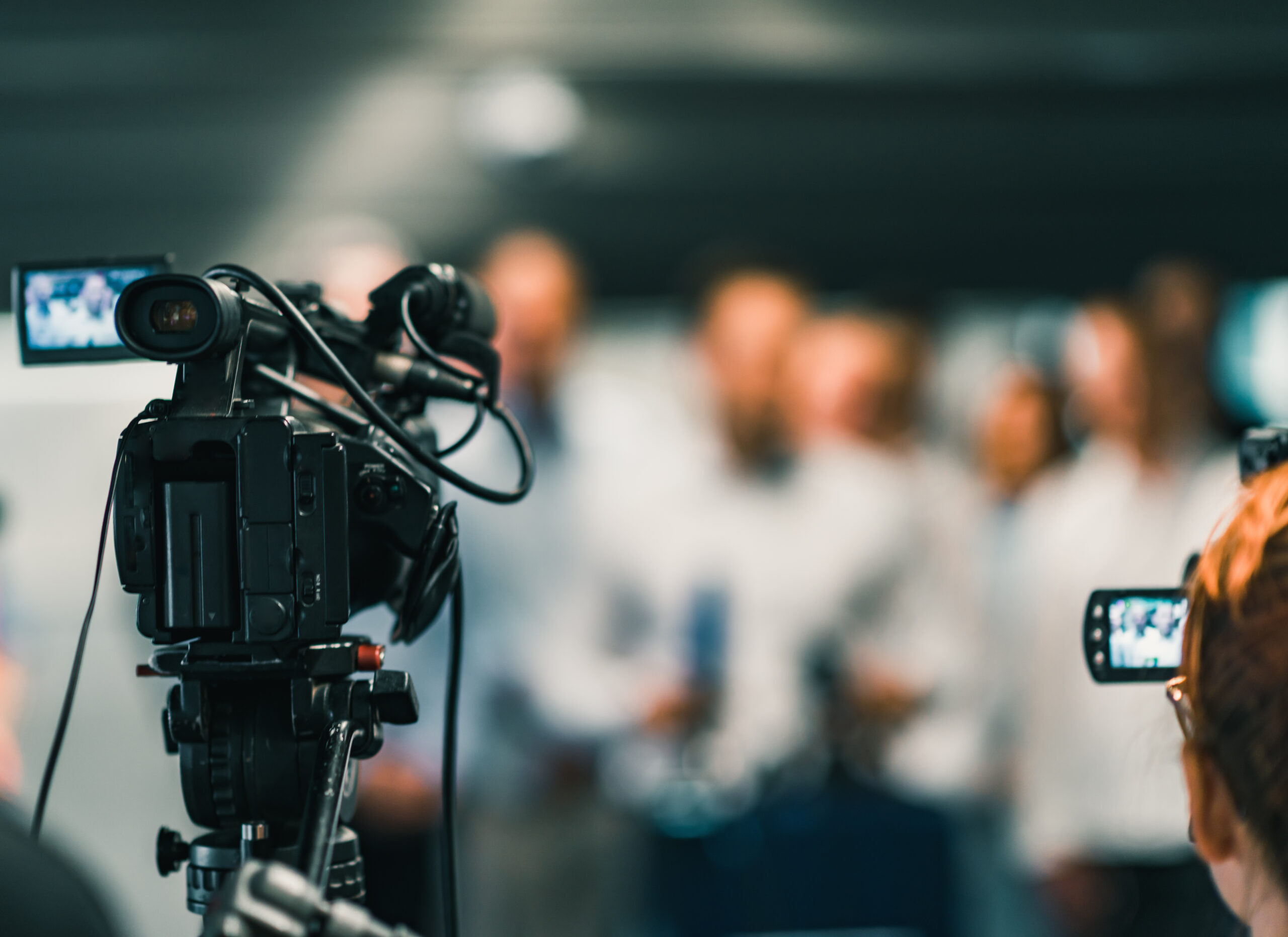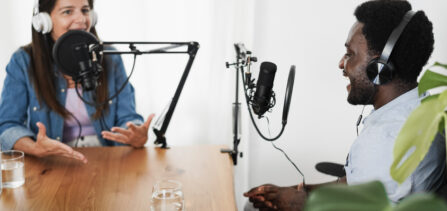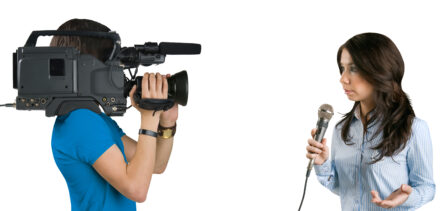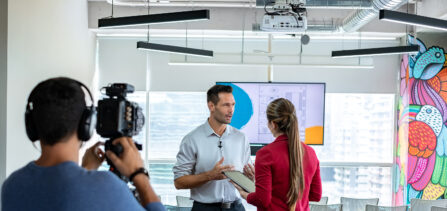
Dealing with the Media – UK Media Skills
To a story-hungry journalist, nothing is sacred, no one is exempt and everyone is vulnerable!
Media Skills and Dealing with the Media – Making the Most of a Media Opportunity
Forget, ‘I’m a Celebrity, Get Me Out of Here!‘
When it comes to dealing with the media, a lot of people want to be whisked away to just about anywhere but the spotlight in which they find themselves.
And of course, with the media playing such an important role in modern life, just about anyone could find themselves smack in the middle of the media spotlight.
Dealing with the Media – 24 Hour News
Nowadays with the advent of 24-hour rolling news and the proliferation of satellite channels and local radio stations, combined with the abundance of newspapers and consumer magazines, there is a great deal of airtime and column inches to fill.
To a story-hungry journalist, nothing is sacred, no one is exempt and everyone is vulnerable.
Relaxed and Confident
Anyone who is dealing with the media or even thinking about appearing on radio, television or video not only has to develop techniques for giving a relaxed and confident performance but, like any good actor, needs to plan and prepare thoroughly for dealing with the media.
Giving simple straightforward answers is not enough. You need to master the television interview.
Good TV or radio interviewers are looking to create something that is both entertaining and informative. It is essential therefore to understand what makes for a good interview and will keep the audience’s attention.
Given also, that some journalists think that entertainment is having a right go at their interviewee, indeed some are proud of their reputation for savaging people, you really do need more than just your expertise.
So what is it you need to know?
Well, to start with we’ve outlined here some of the key areas that should be covered and understood before going anywhere near dealing with the media.
Types of Interview
There are many different TV and radio interview formats, each with its own style and techniques.
When you are asked to attend an interview make sure you know which format is to be used so you know what to expect.
Some of the more common formats (and media jargon) are:
Dealing with the Media in Studio
In the studio (one-to-one or part of a panel)
You are actually there and can see who you’re talking to. It could be recorded but may be live and is likely to be shown as live.
No rehearsal no editing no chance for a second try.
TV Remote
TV Remote booth (down-the-line)
They can see you, they can see the interviewer, but you just get to sit and look at a camera sometimes with an earpiece to listen to the other end.
Radio Telephone
Radio telephone interview
No one can see anyone, but while the interviewer is in his or her studio you could be in your kitchen.
Mobile Location Unit
Mobile Location unit (outside broadcast)
Could be TV or Radio but it is all a bit ad hoc as everyone involved is away from base.
Dealing with the Media being Intrusive
Being Door Stepped
Being doorstepped is really quite nasty. Could involve you talking through a letterbox or being pursued down the street.
Phone Ins
TV and radio phone-ins
Usually a more relaxed and informal chat but occasionally there will be unplanned and difficult questions thrown in when you are off your guard.
Press Conference
Usually where you invite them. It will be more on your terms and you will have prepared your message well beforehand.
Being Prepared for Dealing with the Media
For all the different types of interviews, it is essential that you know what you want to say and spend some time getting your messages clear in your mind.
Because of the time restriction and pressure of giving media interviews, try to restrict yourself to three main messages, removing all extraneous and unwanted material so you are left with a headline sentence or ‘sound-bite’ for each message.
Sound Bite
A sound bite is a quotable quote: brief, self-contained, phrased in everyday language and should be colourful or metaphorical, passionate or energetic.
Being roughly five seconds long, it will need to be clear, concise and punchy.
Think of yourself as doing the journalist’s work for them.
When you have a couple of sound bites ready – ones that you know you want people to hear or read – the journalist just has to extract them from everything else you’ve said and you’ve done the job.
Some Famous Soundbites
“Read my lips, no more taxes“
George Bush Senior
“The reports of my death are premature“
Mark Twain
“Speak softly but carry a big stick“
Teddy Roosevelt
“I believe in equality for everyone, except reporters and photographers“
Mahatma Gandhi
“I may disagree with what you have to you say, but I shall defend, to the death, your right to say it”
Voltaire
“A lie gets halfway around the world before the truth has a chance to get its pants on“
Sir Winston Churchill
Keep Your Message Simple
It is worth spending some time preparing a selection of different sound bites for each of your messages.
This should enable you to choose during the interview the one that best fits the context of the interview.
When you are dealing with the media you need to prepare your messages. Try to think about who your audience is likely to be and how best to appeal to them.
If you are appearing before a generally mixed audience it’s usually best to keep your messages as simple as possible.
Analogies
Analogies can be a good way of simplifying a particularly technical subject.
‘The Bluestreak rocket is like a civil servant. It won’t work and you can’t fire it.’
Generally, you will be invited to give an interview because you are considered some sort of expert in your field.
It follows, therefore, you must know your facts and be aware of any recent changes that may have occurred within your subject or situation.
It can be very embarrassing if the journalist knows more about your area of expertise than you do.
Make Sure You Know Your Stuff!
Test your readiness for dealing with the media by trying to anticipate the type of questions the journalist might ask, both easy and difficult, and have your honed responses ready.
Before the interview, make sure you have found out:
- What the interview is going to be about
- What angle the journalist will take
- Who else will be involved and/or who else the journalist is talking to
- Whether it will be live or pre-recorded for later broadcast
- What form the final broadcast will take (straight one-to-one interview, as part of a report, part of a documentary, etc.)
- How long the final interview will be
- How long the final programme will be
- Who the interviewer is
Appropriate Responses
Having this knowledge allows you to have your messages and appropriate responses prepared in a polished, concise and snappy style.
If you can’t find out or they won’t tell you then you should assume the worst.
Try to find out who else may be appearing with you and where the story has originally come from.
Having this information may make it possible to work out the journalist’s possible agenda and develop an idea of how the interview might proceed.
None the less always be wary.
It is not unknown for journalists and researchers to lie or at the very least just omit certain information in the pursuit of a more dramatic interview.
Always be prepared for difficult or unexpected questions.
Making a Success of the Interview
Once you are clear about what you want to say, the next key element to your success is you: the way you sound, the way you look and the way you come over.
To make the audience listen and take an interest, you may need to project your personality, displaying a little more vitality, enthusiasm and conviction than you would in a normal conversation.
The media likes a strong personality, so try to put as much of yourself into the process as you can – think of the people you remember from interviews and what it is that makes them memorable.
Don’t try and do them just do you but amplified.
As always when dealing with the media time is always against you, there is no opportunity to get warmed up or prevaricate with pleasantries, be ready to go straight into answering the questions and using your prepared messages.
Being Effective when Dealing with the Media
- Grab the audience’s attention
- Keep their interest
- Leave them with a message
Grabbing the Audience’s Attention:
What is interesting here is thinking your way into the listener’s way of hearing.
For instance, one of the ways of getting a listener’s attention is to say ‘you!’ which to them means ‘me’.
By using the word ‘you’ you make the audience feel personally involved, they feel that you are speaking directly to them.
The use of the word ‘you’ can also encourage a listener to see the problem from your perspective, thereby deflecting or putting into perspective some of the negative feelings the interviewer may be directing towards you.
Keeping Their Interest
It is best not to think of the audience as a mass, but as one individual.
That individual is of average intelligence, but not necessarily knowledgeable or particularly interested in your subject.
Try to engage that individual by talking about your subject in a way that they will understand and enjoy.
Using graphic descriptions, and colourful examples, will bring a subject to life and make it more attractive.
It is worth spending some time finding alternative ways of talking about your subject and trying them out on other people to see if they work, before using them in an interview.
It can sometimes help to humanise a subject by directly relating it to people or the viewers at home. You can also improve your technique by understanding the seven key barriers to communication.
Leaving Them With a Message:
You will want to make a lasting impression on your audience.
Dealing with the media means working with a passive audience. A media audience has a short attention span and may have much else going on around them, which is distracting.
It is easy for them to instantly forget both you and anything you may have said.
Having a strong and concise final message, delivered with passion and conviction, will help create the lasting impression you require.
It is often worth placing or reiterating your most important message at the end, as this will be what the audience is most likely to remember after the interview has finished.
The Journalist’s Approach
Every journalist or interviewer will be working to their own agenda, which is unlikely to be the same as yours.
Their job is to make the interview both interesting and entertaining, as well as getting the information they want.
They have a whole arsenal of different approaches and tactics they can call upon to achieve this.
Dealing with the Media
Know the Different Types of Questions
Here are some of the different types of questions they will use:
Open-ended Questions
You can’t reply straight Yes or No
‘What do you really think the problem is?’
Forcing Question
A Paxman favourite which tries to put you in a corner
‘Just answer the question are you or are you not for this scheme?’
Leading Questions
Puts words in your mouth. It’s a question as a statement.
‘So what you’re saying is that it won’t cost any more taxpayers money’
Hypothetical Questions
A device to get you to give a definitive answer to a situation, which isn’t yet defined.
‘So if that were to be the case what are you going to do about it?’
Probing Questions
Seems quite harmless but gets you to say more than you intended
‘That’s an interesting area, how do you personally think it’s going to affect the market?’
Prompting Question
A simple request for more information
‘And that will mean what exactly?’
Explorer’s Questions
Encouraging you to give more details
‘How exactly does that differ from your competitors?’
Classical Questions
Easy questions to make you feel relaxed and get your message across. Sometimes it does not even sound like a question.
‘Tell us a bit about your new project.’
The combination of questions that the interviewer might use will depend on the type of programme (daytime TV, Newsnight, local radio), the time of day it will be broadcast, the duration of the interview and what the journalist hopes to get out of you.
If you do your background research well you should get a good idea of what to expect.
The 5 Golden Rules of Dealing with the Media
- Get your predetermined message across
- Let nothing go by default
- Keep off other people’s business
- Only answer the question asked
- Avoid sounding defensive or that you’ve been ‘got’
Though the ‘media monster’ may bare its teeth every once in a while, you can actually enjoy going into the fray, have your say and leave them wowed and yourself intact!
Dealing with the Media
Impact Factory runs
Tailored Media Skills Training
and personalised
Executive Media Skills Coaching
for anyone interested in Media Skills







